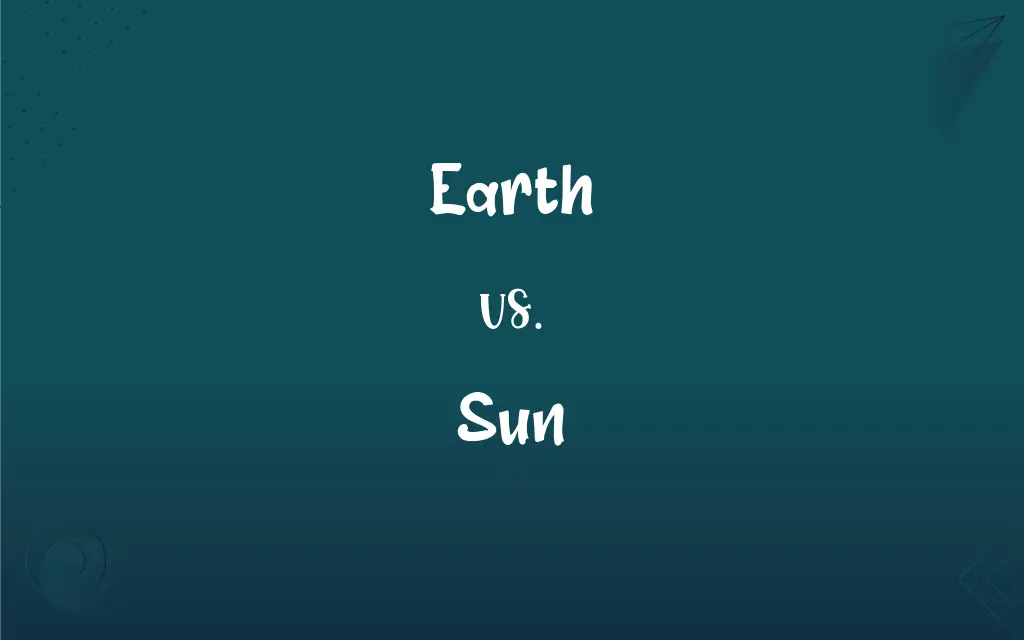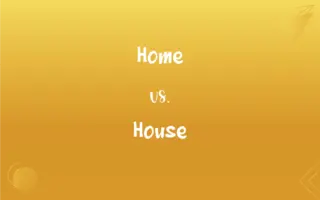Earth vs. Sun: What's the Difference?
Edited by Aimie Carlson || By Janet White || Published on October 28, 2023
Earth, a habitable planet, contrasts with the Sun, a blazing star; both hold different places in life's cosmic dance.

Key Differences
Earth is a terrestrial planet, primarily composed of rock and metal, with a significant feature being its ability to support life in various forms. In contrast, the Sun is a star, a massive, luminous sphere of plasma held together by its own gravity, and the central source of light and energy for Earth, though it itself is not capable of hosting life as we know it.
Earth, with its moderate climate and atmospheric composition, provides the necessary conditions for life and ecosystems to thrive. The Sun, on the other hand, features extreme temperatures and nuclear reactions, its radiance and heat energy crucial, but its surface and environment are far too hostile for Earth-like life forms.
Earth rotates on its axis and revolves around the Sun, the center of our solar system, demonstrating a dependent relationship. However, the Sun operates on a grander scale, influencing not just Earth but the entire solar system through its gravitational force and emitted energy.
Earth's geological activities and weather patterns are significantly influenced by the Sun's energy, although they are governed by internal dynamism and atmospheric conditions. Conversely, the Sun undergoes cycles of solar activity that affect Earth, though these are independent processes dictated by the star’s internal mechanics.
Earth's cultural and historical aspects are rich, with various societies venerating it for its life-giving capabilities. Similarly, the Sun has been revered throughout cultures, symbolizing power, energy, and in many traditions, the divine, due to its overwhelming presence and the life-enabling light it provides to Earth.
ADVERTISEMENT
Comparison Chart
Lexical Category
Noun (Proper)
Noun (Proper)
Initial Letter
E (5th letter)
S (19th letter)
Syllables
One
One
Meaning
3rd planet in the solar system; supports life.
Star at the center of the solar system; provides light/heat.
Usage in Metaphor
Represents life, grounding, or fertility.
Symbolizes illumination, vitality, or authority.
ADVERTISEMENT
Earth and Sun Definitions
Earth
The third planet from the sun in the solar system.
We live on Earth, which is full of diverse life forms.
Sun
A person considered as a source of warmth or energy.
Her toddler was like a little Sun, brightening every room he entered.
Earth
The substance of the land surface; soil.
The gardener planted flowers in the rich, moist Earth.
Sun
To expose to or place in the sun.
She decided to Sun her laundry for a natural freshness.
Earth
A fox's burrow.
The hounds chased the fox back to its Earth.
Sun
Often Sun The star around which Earth and other planets orbit. It provides heat and light to Earth. It has a mean distance from Earth of about 150 million kilometers (93 million miles), a diameter of approximately 1,391,000 kilometers (864,000 miles), and a mass about 333,000 times that of Earth.
Earth
The land surface of the world.
Sun
A star that is the center of a planetary system.
Earth
The softer, friable part of land; soil, especially productive soil.
Sun
The radiant energy, especially heat and visible light, emitted by the sun; sunshine.
Earth
OftenEarthThe third planet from the sun, having a sidereal period of revolution about the sun of 365.26 days at a mean distance of approximately 149.6 million kilometers (92.96 million miles), a sidereal rotation period of 23 hours 56.07 minutes, an average radius of 6,378.1 kilometers (3,963 miles), and a mass of approximately 5.9736 × 1024 kilograms (1.3169 × 1025 pounds).
Sun
A sunlike object, representation, or design.
Earth
The realm of mortal existence; the temporal world.
Sun
To expose to the sun's rays, as for warming, drying, or tanning.
Earth
The human inhabitants of the world:The earth received the news with joy.
Sun
To expose oneself or itself to the sun.
Earth
Worldly affairs and pursuits.
Sun
The star that the Earth revolves around and from which it receives light and warmth.
Earth
Everyday life; reality:was brought back to earth from his daydreams of wealth and fame.
Sun
(astronomy) A star, especially when seen as the centre of any single solar system.
Earth
The substance of the human body; clay.
Sun
The light and warmth which is received from the sun; sunshine or sunlight.
Earth
The lair of a burrowing animal.
Sun
(figurative) Something like the sun in brightness or splendor.
Earth
Chiefly British The ground of an electrical circuit.
Sun
Sunrise or sunset.
Earth
(Chemistry)Any of several metallic oxides, such as alumina or zirconia, that are difficult to reduce and were formerly regarded as elements.
Sun
A revolution of the Earth around the Sun; a year.
Earth
To cover or heap (plants) with soil for protection.
Sun
A transversing of the sky by the Sun; a day.
Earth
To chase (an animal) into an underground hiding place.
Sun
The nineteenth trump/major arcana card of the Tarot.
Earth
To burrow or hide in the ground. Used of a hunted animal.
Sun
(cartomancy) The thirty-first Lenormand card.
Earth
Senseid|en|Q2}} {{alternative case form of Earth; Our planet, third out from the Sun.
The astronauts saw the earth from the porthole.
Sun
A traditional Japanese unit of length, approximately 30.3 millimetres (1.193 inches).
Earth
(uncountable) Soil.
This is good earth for growing potatoes.
Sun
(transitive) To expose to the warmth and radiation of the sun.
Beautiful bodies lying on the beach, sunning their bronzed limbs.
Earth
(uncountable) Any general rock-based material.
She sighed when the plane's wheels finally touched earth.
Sun
(transitive) To warm or dry in the sunshine.
Earth
The ground, land (as opposed to the sky or sea).
Birds are of the sky, not of the earth.
Sun
(intransitive) To be exposed to the sun.
Earth
(British) A connection electrically to the earth (US ground); on equipment: a terminal connected in that manner.
Sun
To expose the eyes to the sun as part of the Bates method.
Earth
The lair or den (as a hole in the ground) of an animal such as a fox.
Sun
See Sunn.
Earth
A region of the planet; a land or country.
Sun
The luminous orb, the light of which constitutes day, and its absence night; the central body round which the earth and planets revolve, by which they are held in their orbits, and from which they receive light and heat. Its mean distance from the earth is about 92,500,000 miles, and its diameter about 860,000.
Earth
Worldly things, as against spiritual ones.
Sun
Any heavenly body which forms the center of a system of orbs.
Earth
The world of our current life (as opposed to heaven or an afterlife).
Sun
The direct light or warmth of the sun; sunshine.
Lambs that did frisk in the sun.
Earth
(metonymically) The people on the globe.
Sun
That which resembles the sun, as in splendor or importance; any source of light, warmth, or animation.
For the Lord God is a sun and shield.
I will never consent to put out the sun of sovereignity to posterity.
Earth
Any planet similar to the Earth (our earth): an exoplanet viewed as another earth, or a potential one.
New space telescopes may accelerate the search for other earths that may be out there.
Sun
To expose to the sun's rays; to warm or dry in the sun; as, to sun cloth; to sun grain.
Then to sun thyself in open air.
Earth
(archaic) The human body.
Sun
A typical star that is the source of light and heat for the planets in the solar system;
The sun contains 99.85% of the mass in the solar system
Earth
The aforementioned soil- or rock-based material, considered one of the four or five classical elements.
Sun
The rays of the sun;
The shingles were weathered by the sun and wind
Earth
Any of certain substances now known to be oxides of metal, which were distinguished by being infusible, and by insolubility in water.
Sun
A person considered as a source of warmth or energy or glory etc
Earth
To connect electrically to the earth.
That noise is because the amplifier is not properly earthed.
Sun
Any star around which a planetary system evolves
Earth
(transitive) To bury.
Sun
First day of the week; observed as a day of rest and worship by most Christians
Earth
(transitive) To hide, or cause to hide, in the earth; to chase into a burrow or den.
Sun
Expose one's body to the sun
Earth
(intransitive) To burrow.
Sun
Expose to the rays of the sun or affect by exposure to the sun;
Insolated paper may turn yellow and crumble
These herbs suffer when sunned
Earth
The globe or planet which we inhabit; the world, in distinction from the sun, moon, or stars. Also, this world as the dwelling place of mortals, in distinction from the dwelling place of spirits.
That law preserves the earth a sphereAnd guides the planets in their course.
In heaven, or earth, or under earth, in hell.
Sun
The star around which Earth orbits.
The Sun rises in the east and sets in the west.
Earth
The solid materials which make up the globe, in distinction from the air or water; the dry land.
God called the dry land earth.
He is pure air and fire, and the dull elements of earth and water never appear in him.
Sun
The light or warmth received from the earth's sun.
We enjoyed the Sun on our skin during the summer beach trip.
Earth
The softer inorganic matter composing part of the surface of the globe, in distinction from the firm rock; soil of all kinds, including gravel, clay, loam, and the like; sometimes, soil favorable to the growth of plants; the visible surface of the globe; the ground; as, loose earth; rich earth.
Give him a little earth for charity.
Sun
Something considered to resemble the sun, as in warmth or brilliance.
The diamond was a dazzling Sun in the jeweler's showcase.
Earth
A part of this globe; a region; a country; land.
Would I had never trod this English earth.
Earth
Worldly things, as opposed to spiritual things; the pursuits, interests, and allurements of this life.
Our weary souls by earth beguiled.
Earth
The people on the globe.
The whole earth was of one language.
Earth
Any earthy-looking metallic oxide, as alumina, glucina, zirconia, yttria, and thoria.
Earth
A hole in the ground, where an animal hides himself; as, the earth of a fox.
They [ferrets] course the poor conies out of their earths.
Earth
The connection of any part an electric conductor with the ground; specif., the connection of a telegraph line with the ground through a fault or otherwise.
Earth
A plowing.
Such land as ye break up for barley to sow,Two earths at the least, ere ye sow it, bestow.
Earth
To hide, or cause to hide, in the earth; to chase into a burrow or den.
Earth
To cover with earth or mold; to inter; to bury; - sometimes with up.
The miser earths his treasure, and the thief,Watching the mole, half beggars him ere noon.
Why this in earthing up a carcass?
Earth
To burrow.
Earth
The 3rd planet from the sun; the planet on which we live;
The Earth moves around the sun
He sailed around the world
Earth
The loose soft material that makes up a large part of the land surface;
They dug into the earth outside the church
Earth
The solid part of the earth's surface;
The plane turned away from the sea and moved back over land
The earth shook for several minutes
He dropped the logs on the ground
Earth
The abode of mortals (as contrasted with heaven or hell);
It was hell on earth
Earth
Once thought to be one of four elements composing the universe (Empedocles)
Earth
The concerns of the world as distinguished from heaven and the afterlife;
They consider the church to be independent of the world
Earth
A connection between an electrical device and the earth (which is a zero voltage)
Earth
Hide in the earth like a hunted animal
Earth
Connect to the earth;
Earth the circuit
Earth
A connection to ground in an electrical circuit.
For safety reasons, all homes need an Earth to prevent electrical shocks.
Earth
The inhabitants or the human world.
War affects all the Earth with its destructive consequences.
FAQs
Does Earth refer only to the planet we live on?
Primarily, yes, but "earth" can also mean soil or ground.
Is Earth capitalized always?
When referring to the planet, yes. Not when referring to soil or electrical grounding.
Is the Sun a planet like Earth?
No, the Sun is a star, not a planet.
Is it 'Sun' or 'sun'?
Capitalize "Sun" when referring to the star, not when it means sunlight or warmth.
Are there other planets like Earth near the Sun?
No other planet near the Sun is known to support life as Earth does.
Can we live on the Sun?
No, it's too hot and hostile for life.
Can Earth be used in contexts other than astronomical?
Yes, it can refer to soil, electrical grounding, or humanity, among others.
How important is Earth in astronomy?
Very, it's our home and the only known planet with life.
Does Earth mean the same in all forms of English?
Yes, but spellings and usage may have minor variations.
Is the Sun the closest star to Earth?
Yes, it's the nearest star.
Does the Sun move around Earth?
No, Earth orbits the Sun.
What’s the role of the Sun in Earth’s climate?
It's the primary energy source driving weather, climate, and life.
How does Earth compare to other planets?
It's unique due to its atmosphere, water, and life.
What's unique about Earth in literature?
It's often personified and symbolizes life or nurturing.
Is Earth only a scientific term?
No, it's used in everyday language and various contexts.
Is the Sun always active?
It has cycles of high and low activity, but it's always active.
How big is the Sun compared to Earth?
The Sun is vastly larger, with over a million Earths able to fit inside it.
Does the Sun have other names?
It's called "Sol" in scientific communities.
Can the Sun burn out?
Eventually, in billions of years, it'll turn into a red giant and then a white dwarf.
Do all cultures view Earth similarly?
Views vary, but most recognize its life-supporting role.
About Author
Written by
Janet WhiteJanet White has been an esteemed writer and blogger for Difference Wiki. Holding a Master's degree in Science and Medical Journalism from the prestigious Boston University, she has consistently demonstrated her expertise and passion for her field. When she's not immersed in her work, Janet relishes her time exercising, delving into a good book, and cherishing moments with friends and family.
Edited by
Aimie CarlsonAimie Carlson, holding a master's degree in English literature, is a fervent English language enthusiast. She lends her writing talents to Difference Wiki, a prominent website that specializes in comparisons, offering readers insightful analyses that both captivate and inform.































































